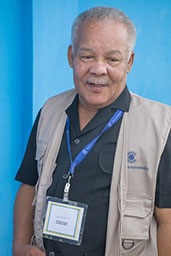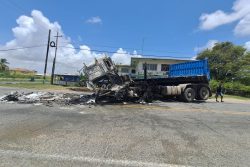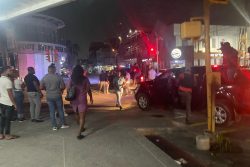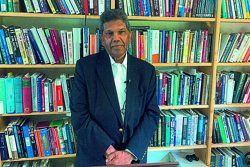Echoing a recommendation made over previous electoral cycles, the Commonwealth elections observation mission has called for the reform of the Guyana Elections Commission (GECOM) and has also urged that any election-related dispute be expeditiously addressed through appropriate dispute resolution mechanisms.
“A key issue repeatedly raised in our interactions was the urgent need for constitutional and electoral reform to address what stakeholders view as a complex and multi-faceted polarisation of the nation. These divisions are reflected in the composition, structure and operations of GECOM itself,” Chairperson of the Commonwealth Observer Group, former Barbadian Prime Minister Owen Arthur, told a press conference at Cara Lodge, Georgetown, yesterday, where he presented the group’s main findings in an interim statement for its observing of the general and regional elections on Monday.
“It is essential that electoral processes be fully inclusive of different political stakeholders and minority groups,” he said.
Even as the mission concluded that notwithstanding the difficulties and challenges surrounding these elections, for the most part Guyanese had the opportunity to express their will and exercise their franchise, Arthur lamented that recommendations made over the years had not been implemented. He called on Guyana to establish a mechanism focused on electoral and constitutional reform and use recommendations from observer missions in doing so.
“We are aware that many recommendations from previous Commonwealth and other observer groups regarding electoral and constitutional reform, whilst not binding on Guyana, remain to be implemented,” the former Bajan PM said.
“When Commonwealth Heads met in London in 2018 and endorsed Revised Commonwealth Guidelines for the Conduct of Election Observation in Member Countries, they noted that ‘Commonwealth election observation has far greater impact and value when recommendations offered by a Commonwealth Observer Group and other observers, are addressed so as to reduce the risk of shortcomings in future elections. Ideally there should be some form of domestic mechanism in place in each member country to review the conduct of an election and to take forward prospective reforms as required’,” he added.
“In this context, we encourage Guyana to create such a domestic mechanism to consider electoral and constitutional reforms, including the merits and demerits of the structure of the Guyana Electoral Commission and the electoral system itself. Electoral reform is a continuous process building on what has worked successfully and addressing weaknesses,” Arthur asserted.
The team is expected to complete its report before they leave next Monday. The final report, setting out their full findings on the entire process and recommendations in greater detail, will be submitted to Commonwealth Secretary-General Patricia Scotland.
Dominated
Meantime, the mission observed that the campaign was dominated by APNU+AFC and the PPP/C and while the environment was tense and divisive, overall, fundamental freedoms of association, expression, assembly and movement were generally respected.
Regarding the early voting by the joint services, Arthur said that the exercise was undertaken in an orderly manner, with most procedures followed. “We are concerned, however, that citizen observers were not accredited to observe this important part of the electoral process. We encourage early accreditation of citizen observers to enable them to observe early voting in future elections. Several stakeholders we met also called for early voting to be extended to other key workers who are on duty on the main Election Day, including polling staff,” he said.
On election day, the mission said that polling was conducted in an orderly, transparent and largely peaceful environment and polling stations were generally well-organised and prepared for the polls, and opened promptly, with a full complement of staff.
The Commonwealth team lauded the efforts by GECOM staff and said that election day was commendable and reflective of a free, fair and transparent process.
However, concern was expressed about the location of some polling stations on upper floors of schools and sports complexes, even where there appeared to be more accessible alternatives on the ground floor. This disadvantaged the elderly and persons with disabilities, among others, who faced challenges accessing the said polling units, Arthur said.
The police came in for praise for their orderly voting and later maintenance of law and order at polling stations, and facilitating the operations of the polling staff.
“We acknowledge the important role played by the police in securing polling units. Their presence was adequate and non-intrusive. We are satisfied with the police response to the reported small number of security incidents on polling day,” Arthur said.
Improved
Meantime, the Commonwealth observer mission head said that several aspects of the polling, counting, results tabulation and transmission of results processes could be improved by clearer written instructions and illustrations for polling staff. “For example, the Manual for Presiding Officers & Other Polling Day Officials does not contain illustrations on what constitutes a valid or invalid vote, which led to some uncertainty and ambiguity at the counts we witnessed. Furthermore, updated instructions on the role of the Deputy Returning Officers in the transmission of Statements of Poll were not provided in writing and were inconsistently applied,” Arthur said.
The late signing of a code of conduct by political parties was criticised. “Three days before the elections, political parties signed a Code of Conduct facilitated by GECOM. It is unfortunate that such an important measure was concluded so close to the vote,” Arthur said. Concern was also expressed regarding the efforts of GECOM to minimise the use of private residences as polling places through greater use of public polling locations.
“The Group noted with considerable concern that the list of polling stations was not concluded until just two days before the election itself. This concern was reflected in the Group’s briefings with most stakeholders,” Arthur said.
Among the other observations made was the high number of names on the Official List of Electors, which contained some 660,998 names. “It is clearly high in relation to the estimated 785,000 population of Guyana,” Arthur said while pointing out that attempts by GECOM to create a new National Register of Registrants Database between July and August 2019, was not completed.
It is to this end that the group believes that “a comprehensive reform of the voter registration system, including legislative reform, is required.”
The need to revise, update and implement campaign finance laws and regulations was also highlighted. Arthur pointed out that the current limit on expenses ranges from $25,000 to $50,000 or the equivalent of US$125-250. “This is clearly outdated. Current legislation neither makes provision for disclosure of sources of contributions, nor provides effective enforcement mechanisms. Further, no guidance on the use of state resources exists in legislation,” he said.
Highlighted as well was that while existing legislation provides for a 33% quota for women in the submission of party lists at nomination, it does not mean that least 33% of elected officials will be women. It was noted that three of the nine presidential candidates were women, as were two of the nine prime ministerial candidates. “We encourage all political parties to take stronger action to promote genuine inclusion and political participation of women,” Arthur said.
The media not having a Code of Conduct for itself was also pointed out and mission said that it believes that one would have been beneficial to promote good media conduct for the coverage of electoral process.
In awaiting the results, the Commonwealth team is urging Guyanese to exercise the same patience and commitment to their democracy as they did during voting. “We appeal to them to maintain the same commitment in the post-election period…We urge that any disputes be expeditiously addressed through appropriate dispute resolution mechanisms,” Arthur said.










